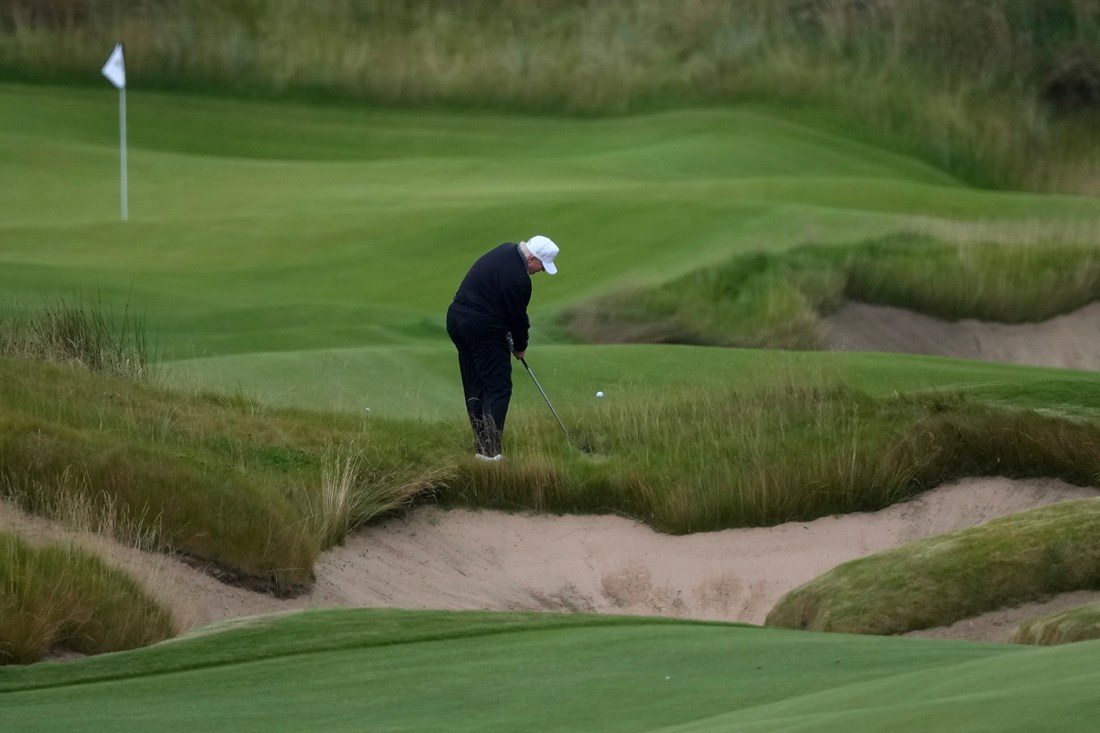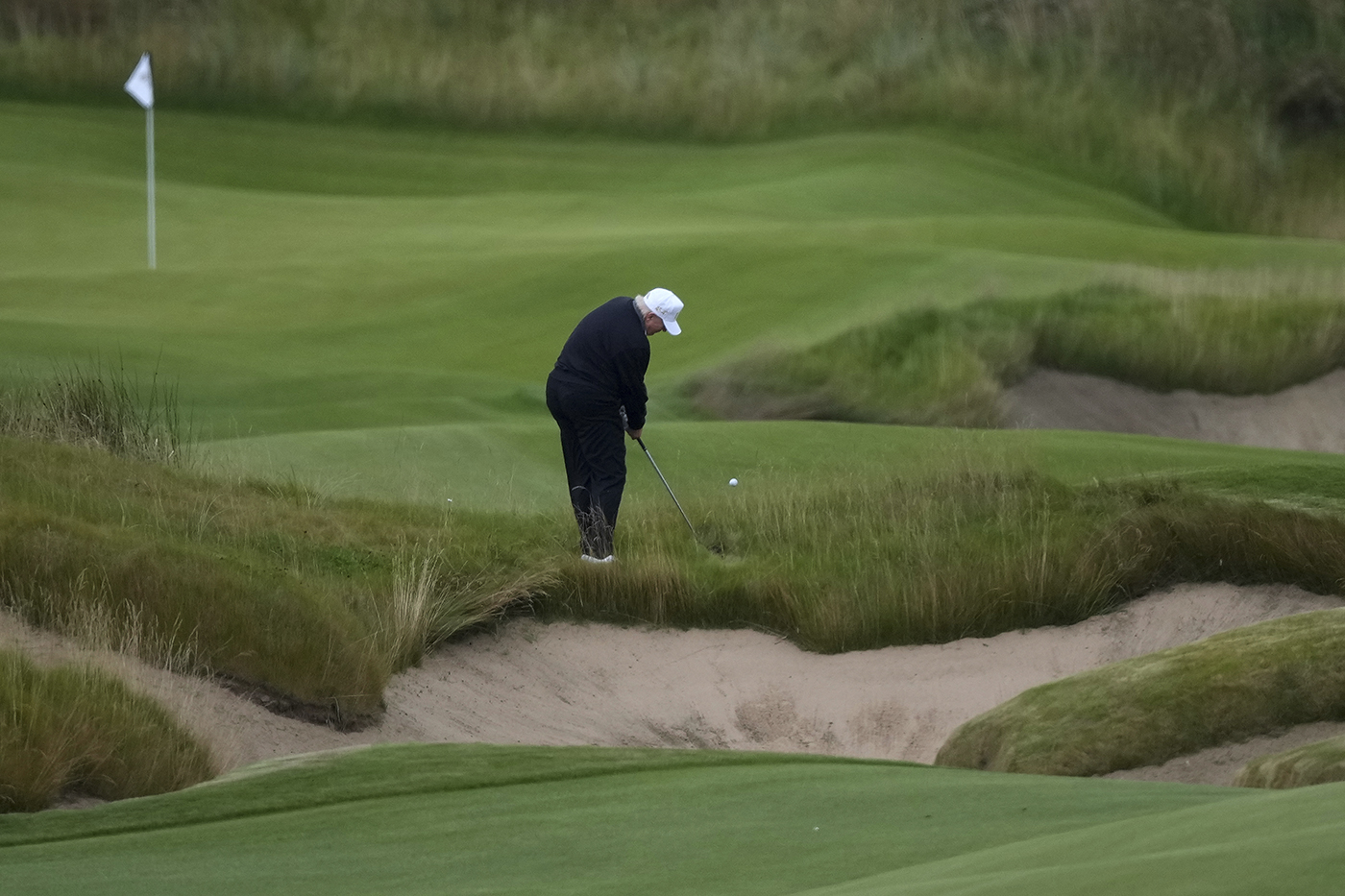Golf has always been a big sport in business circles. It is no surprise that politics is getting in on the action as well, say Northeastern academics.
![]()
 President Donald Trump is a keen golf player like many of his predecessors at the White House. AP Photo/Alastair Grant
President Donald Trump is a keen golf player like many of his predecessors at the White House. AP Photo/Alastair Grant
LONDON — Mark Twain is said to have popularized the saying that “golf is a good walk spoiled.” It seems few U.S. presidents would have agreed with him.
President Dwight Eisenhower is estimated to have played more than 800 rounds of golf during his presidency between 1953-61 (that’s a game every three to four days, according to golf news website Bunkered).
Some apocryphal stories suggest that much of President Lyndon B. Johnson’s political negotiations ahead of the Civil Rights Act passing in 1964 took place as he hacked away on the fairways. President Barack Obama, who clocked 333 rounds between 2009-17, loved to practice his left-handed swing so much that he had a golf simulator installed at the White House.
And now, the United States arguably has its biggest golf fan in the Oval Office in the form of President Donald Trump, who reportedly has a single digit handicap and owns 18 golf resorts across the world. There is even a dedicated website called Did Trump Golf Today?
So what is it about leaders of the free world enjoying a long-form and time-demanding game like golf?
Ahmad Alnajadah, assistant professor in business at Northeastern University in London, says golf is a rare sport in that it allows for socializing and networking at the same time.
“While it seems counterintuitive that busy leaders would choose such a time-intensive activity,” says Alnajadah, “golf’s four- to five-hour duration actually creates uninterrupted relationship-building opportunities that are increasingly rare in our hyper-connected world. It’s one of the few socially acceptable ways to have someone’s undivided attention for hours.”
George H.W. Bush (handicap, 11) is recorded as saying that it was “amazing how many people beat you at golf now that you’re no longer president.” It may have been a comment said in jest, but it hints at the fact that some presidential golf associates may be looking to curry favor over the course of 18 holes.
The formality of the sport, Alnajadah argues — with its dress codes, manicured lawns and exclusive clubhouses — lends itself to doing business and holding talks.
“The golf course takes away the formal meeting setting where you have that boardroom where it is cold and you’re sitting on opposite sides of each other,” he says. “It breaks that formality when you’re playing a game of golf. You can take jabs at each other if someone misses, you can have more informal conversations.
“It is more natural and organic to have it in that type of setting — the game of golf allows for it. You can’t build a relationship with someone if you’re playing one-on-one or five-on-five basketball, because you’re just running back and forth. You can’t even do it in tennis. You could do it afterwards or during breaks in between.
“But golf is the only sport that I feel like you can play individually, but really be able to take your time and assess people in that process.”
The relaxed and scenic setting of a golf course lends itself to deal-making, according to Evodio Kaltenecker, an associate teaching professor in international business and strategy at Northeastern.
“The game itself encourages conversation during long periods,” the Oakland-based academic says, “which allows for the development of personal relationships, something important for building trust and rapport. Golf facilitates coming to an agreement.”
That was put into practice on the world stage recently by Trump when he used what the White House described as a “private visit” to his Turnberry golf resort in Ayrshire, Scotland, to announce a trade deal between the U.S. and the European Union.
During his time at his two Scottish resorts in July, he hosted the European Commission President Ursula von der Leyen, held talks about the Middle East with British Prime Minister Keir Starmer and discussed whisky tariffs with Scotland’s first minister, John Swinney.
Kaltenecker remarks that U.S. presidents long before Trump, including John F. Kennedy (handicap, 7) and George W. Bush — his “Now watch this drive” remark to reporters made it into Michael Moore’s “Fahrenheit 9/11” documentary — have enjoyed golf in the same way as countless chief executives have. The difference now, he says, is that Trump also has investments in the sport.
“The intertwining between golf and business, business and politics, and politics and golf are not new,” he explains. “However, the novelty here is the triple intertwining of golf, business and politics altogether. The new angle now is that Trump not only plays golf but also has business interests in the sport, with his golf courses, resorts and hotels.”
Trump is known to take an avid interest in his golf assets. As well as using his summer visit to Scotland to open a new course in Aberdeenshire, he was seen, according to reports in The Times of London, checking on guests at Turnberry to ensure they were having a good time. He was even spotted clearing up empty glasses to ensure the place was tidy.
Kaltenecker says transparency issues could arise out of Trump’s golf-related business arrangements, highlighting that lobbyists could look to use golf outings and sponsorships in a bid to gain access to decision-makers in Trump’s administration.
“The intersection of golf, business and politics can raise ethical concerns when individuals in positions of power use their access to create personal or financial gain,” Kaltenecker explains.
It has also been true the other way around, that Trump’s politics have impacted his business. In March, activists from the pro-Gaza group Palestine Action, which has since been banned in the U.K., vandalized his Turnberry resort in response to the president’s comments on the Middle East conflict.
Trump has lobbied for Turnberry to host the British Open, but his son Eric Trump conceded in a recent BBC interview that “politics” has been the “elephant in the room” for event organizers.
Even with that, the links between golf and politics are likely to remain a feature at least until the second Trump term is over in 2029, says Kaltenecker.
“Looking ahead, I believe we will see even more examples of the triple intertwining of golf, business and politics,” he continues. “Not only because golf is the quintessential sport of business but, most importantly, because Trump is the U.S. president with the deepest ties in the sport, both as a practitioner and as an owner of several resorts around the world.
“All in all, golf serves as a deal-making and relationship-building opportunity. However, this convergence also raises ethical considerations and potential conflicts of interest that require scrutiny.”
Society & Culture
Recent Stories
:where(:not(.alignleft):not(.alignright):not(.alignfull)){max-width:600px;margin-left:auto !important;margin-right:auto !important;}.wp-container-core-group-is-layout-8fa4946a > .alignwide{max-width:1280px;}.wp-container-core-group-is-layout-8fa4946a .alignfull{max-width:none;}.wp-container-core-group-is-layout-8fa4946a > *{margin-block-start:0;margin-block-end:0;}.wp-container-core-group-is-layout-8fa4946a > * + *{margin-block-start:var(–wp–preset–spacing–40);margin-block-end:0;}.wp-container-core-group-is-layout-aaffb961 > :where(:not(.alignleft):not(.alignright):not(.alignfull)){max-width:832px;margin-left:auto !important;margin-right:auto !important;}.wp-container-core-group-is-layout-aaffb961 > .alignwide{max-width:832px;}.wp-container-core-group-is-layout-aaffb961 .alignfull{max-width:none;}.wp-container-core-post-content-is-layout-575ec271 > :where(:not(.alignleft):not(.alignright):not(.alignfull)){margin-left:auto !important;margin-right:auto !important;}.wp-container-core-post-content-is-layout-575ec271 .alignfull{max-width:none;}
]]>







